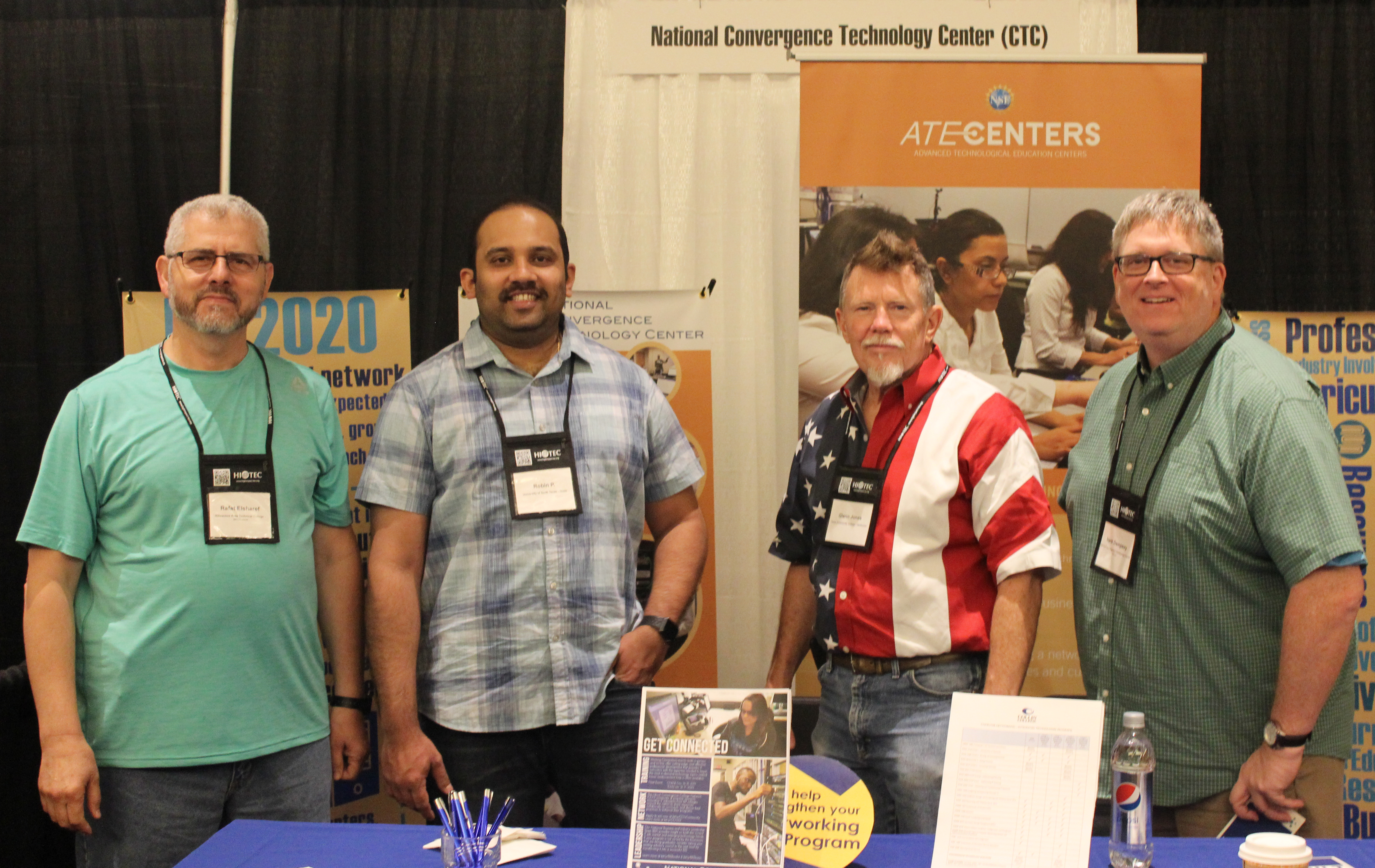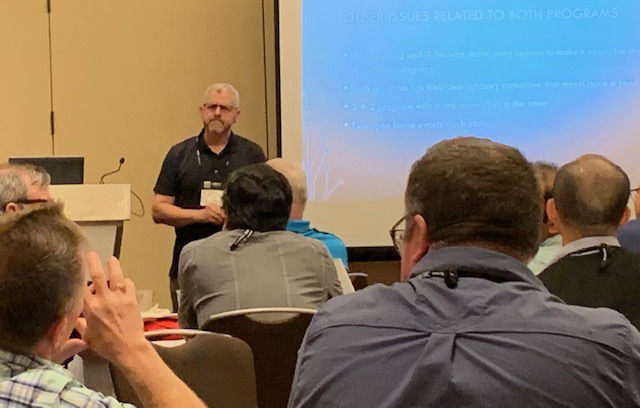CCN Feature: Rafat Elsharef, Milwaukee Area Technical College (MATC)

Pictured here at last years HI-TEC from left to right: Rafat Elsharef of Milwaukee Area Technical College (MATC), Robin Pottathuparambil of University North Carolina (UNC); Glen Jones of Tulsa Community College (TCC); and Mark Dempsey of Collin College (CC)
As a part of the National Convergence Technology Center (CTC) featured blogs, we would like to introduce to you some of our professors and instructors in the Convergence College Network (CCN) community. The CCN is a select cohort of community colleges and universities from across the country that connects IT educators with a wealth of resources to enhance their programs. In this week’s Q&A blog, we’re featuring Rafat Elsharef, Instructor of IT Networking and IT Security at Milwaukee Area Technical College (MATC).
Where do you teach? I’m from the Milwaukee area, Milwaukee Area Technical College.
How long have you been a teacher? I have been teaching IT Networking and IT Security for the last 19 years, full time. Before that, I was working as a full time Network Engineer and I taught part-time.
Did you have a job in the industry prior to teaching? I was teaching part-time and working in the IT industry. I was a network engineer with many organizations in the Wisconsin area. I was a networking engineer for a company called Fiserv, a financial institution. And before that, I was working as a senior network engineer with WiscNet, mainly configuring Cisco routers. At WiscNet, we were overseeing the educational backbone for all of Wisconsin. At that time, it was a backbone that connected all the four-year universities, two-year colleges and K-12 libraries. I was one of the engineers overseeing all the troubleshooting and configurations.
What sparked your interest in teaching? In general, you have this knowledge and you want to give it back. I have a passion for networking and information security. It really feels good to reach back from your experience and give to the students and the community that you grew up in, in terms of teaching the students exactly what you experienced in real life working as a network engineer. My experience was the main factor in me teaching part-time
What is the secret to successfully teaching IT students? As an instructor who is teaching in the area of IT, having the experience is a great thing. Working in the field and having the hands-on experience before teaching gives the teacher the ability to link the book and materials explained in the class to real life scenarios and examples.

Rafat Elsharef teaching a class during the 2019 HI-TEC in St. Louis, MO.
What is the biggest challenge in teaching IT? I think change is a challenge that everybody faces in this field. You have to keep up with the changes and sometimes it’s very hard, very tiring, very draining to the person, but I think our passion for IT and security is what keeps us going. And I would like to thank the National Convergence Technology Center for providing this training for us. Without this training [such as Working Connections events], we would be really behind and, in this field, you can’t be behind. If you’re behind, you’re obsolete. It’s very critical. I’ve been attending CTC’s training for a while now, and I think every year, we really benefit from something new which is really great.
And do you have a favorite class to teach, if so, why? I started with Cisco which is my background, then I moved into security which is what I love to teach. The interesting part about security is that it’s more challenging. There is something new every day. It’s not like something that you teach today, and you teach tomorrow and there aren’t any exciting or challenging things. Every day in the news you hear that something happened in security and then you go back and see what’s going on. What’s happening? How can I address this in the class? How can I teach my students about it? What can we do to prevent this in the future? Classes in security are all great classes. I teach Network Specialist; I teach Digital Forensics; I teach Risk Management; and I teach Wireless Security. So, these are great classes that I really love.
What is the best thing about being a teacher? You feel like you’re giving back to society. They (college) gave you all this education, and you feel that this is part of giving back. The nice thing on top of all this is when you see your students graduating and having a job that they can earn a living. You’re proud of their effort and you feel that you’re part of the success.
What advice would you give an IT student that is about to graduate and enter the workforce? Don’t wait until you graduate to start looking for a job; it’s too late. I would say if you have two semesters left, start confirming internships and start connecting to companies. If you have an internship, you’re almost there to get the job. If you graduate without the internship, you are going to struggle. I’ve seen some students that graduated and did not have an internship, they struggled at the end to find a job. Students who are active and able to find an internship either gets the job from that internship or other companies want them because of their IT or the soft skills that they gain through the internship. You have to connect with industries in the field before you graduate.
The other advice is certifications. Having certifications allows a student to distinguish themselves from other students. It’s a good thing to have under your belt a few certifications especially in the security areas – Security +, maybe some forensics if you’re interested in forensics, CYSA +, CompTIA and others – that will help a lot to get you in the field and will distinguish from others while applying.
Another area of advice that I would give to my students is to participate in is both the CCDC (National Collegiate Cyber Defense Competition) and NCL( National Cyber League) to practice real life scenarios of defensive and offensive security.
How do you keep up with the ongoing evolution of IT? One way is going for training. Another way is to read the latest. When I’m going to my class, I find out what happened lately in the field and try to address it whether by video or reading an article, and that forces me to stay on top of things.
How do you see the IT landscape changing in the next five years? I would say in the next three years, five years is a long time. From the trends that I see and in talking to others and seeing what they are doing, I think cloud is going to be really huge. Literally, it’s going to change not only with teaching delivery, but the content of what we’re teaching. Instead of having a data center on premise, companies are going to have data centers in the cloud. How do you address security? It’s going to be completely different. How do we teach forensics? How will we do firewalls? Virtualizations? We will have to rethink all of this in terms of curriculum. Probably within three years, maximum five years, we will have to recreate all of this material to adapt to the new cloud. Why would I talk to students about routers which is inside the premises if everything is virtual? I took AWS this semester and I think it basically changed my mind about all these classes. It’s going to be interesting.
Anything else you would like to share that I didn’t mention? This is a great opportunity if you have a passion for it.
